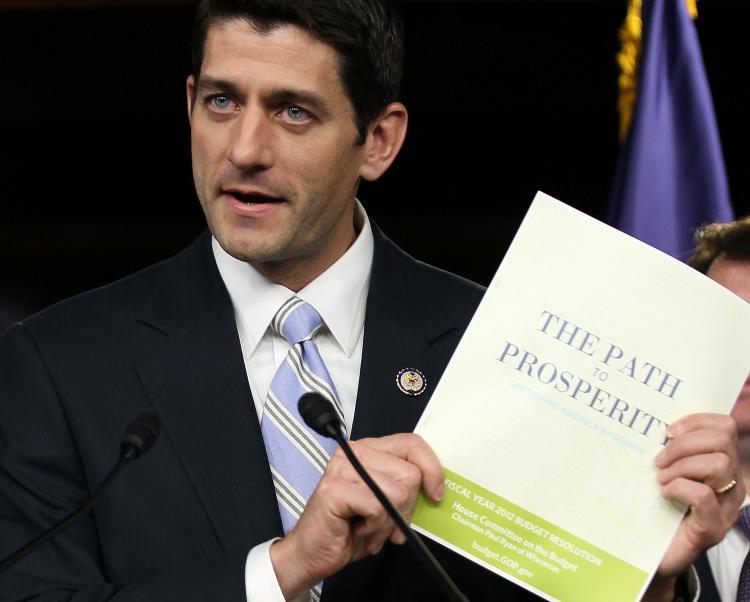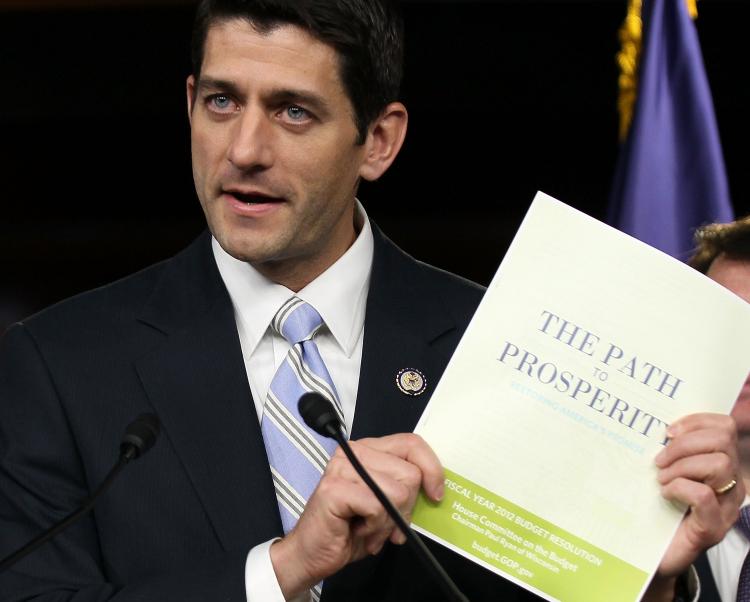WASHINGTON—House Republicans have unveiled comprehensive and bold proposals for entitlement and tax reform that will likely define the 2012 budget debate in the months ahead.
“This budget marks the new house majority’s answer to history’s call,” said Paul Ryan (R-Wis.), chairman of the House Budget Committee, during a presentation at AEI after the official release of the Path to Prosperity earlier Tuesday.
Ryan has received praise for being the first elected official willing to get serious about reining in entitlement costs, a move seen to carry considerable political risk.
Medicare and Medicaid, as well as Social Security, are the largest drivers of the national debt, but they are also areas where Americans consistently resist cuts.
Ryan said today that he believes Americans are ready for “honest talk,” and ready to be “spoken to like adults ... about what is really needed to save this country.”
The president’s 2012 budget was criticized on its release date in February specifically for excluding entitlement reform, although the president expressed that he was open to discussing it with members of Congress.
Ryan’s budget proposal focuses on and aims to achieve as much of $6.2 trillion in spending cuts relative to the Congressional Budget Office’s current baseline level.
A large portion of the savings would come from health care reform, which begins with capping the government’s Medicaid coverage and bundling payments in the form of block grants issued to states.
The assumption is that the increased flexibility accorded to the states under such an arrangement would allow governors to tailor programs to local needs, but critics warn that free from federal program restrictions, the policy change would likely result in millions of uninsured or underinsured Americans going without needed care.
For Medicare, the proposal calls for a system of premium payments, determined on a sliding scale based on individuals’ income levels. Only Americans currently under the age of 55 would be affected.
Americans with more wealth would qualify for less, while individuals with less income would be subsidized more. Insurance companies, rather than health care providers, would receive the premiums.
“It is a dramatic and revolutionary change in the program,” said Concord Coalition Policy Director Josh Gordon.
Ryan says the plan’s policies reflect free market principles for health care, with 300 million people acting as consumers to drive innovation.
“The devil is in the detail. Competition alone will not work, certainly at the speed that this plan requires,” said Gordon.
On Social Security, the other major entitlement area, the Path to Prosperity calls for proposals from the president and others on how to restore the government’s trust funds and make the program solvent, while leaving a House Republican alternative for another day.
The GOP plan is heavy on spending cuts (versus increases in revenue). The Bush tax cuts are made permanent, and the top rate for individuals and businesses is reduced from 35 percent to 25 percent. Reduced revenue is offset with the elimination of corporate tax loop holes. Farm subsidies, including corn, would also be up for expiration, Ryan said.
On education, dozens of job training programs would be consolidated into a career scholarship plan.
Secretary of Defense Robert Gates’s defense budget request would be supported without modifications.
Traditional energy producers would see a boost, with the pull back of moratoriums on domestic oil exploration and drilling, and the elimination of green energy subsidies.
Agency budgets would be lowered to 2008 levels and kept there for five years—and under a mandate of “focusing agencies on core missions,” implementation of the new health care law would be curbed, as would EPA’s controversial work on greenhouse gas regulations.
The president’s press secretary, Jay Carney, said in a statement, that Ryan’s budget “fails the test” of a plan that reflects “American values of fairness and shared sacrifice.”
“It cuts taxes for millionaires and special interests while placing a greater burden on seniors who depend on Medicare or live in nursing homes, families struggling with a child who has serious disabilities, workers who have lost their health care coverage, and students and their families who rely on Pell grants,” he stated.
“President Obama believes there is a more balanced way to put America on a path to prosperity” Carney stated.
“This budget marks the new house majority’s answer to history’s call,” said Paul Ryan (R-Wis.), chairman of the House Budget Committee, during a presentation at AEI after the official release of the Path to Prosperity earlier Tuesday.
Ryan has received praise for being the first elected official willing to get serious about reining in entitlement costs, a move seen to carry considerable political risk.
Medicare and Medicaid, as well as Social Security, are the largest drivers of the national debt, but they are also areas where Americans consistently resist cuts.
Ryan said today that he believes Americans are ready for “honest talk,” and ready to be “spoken to like adults ... about what is really needed to save this country.”
The president’s 2012 budget was criticized on its release date in February specifically for excluding entitlement reform, although the president expressed that he was open to discussing it with members of Congress.
Get the Debt Down
Ryan and other Republicans have accused the president of failing to take action to bring down the debt. Without it, they say another debt crisis is inevitable, as higher interest rates in the future would cause government debt payments to skyrocket to unsustainable levels.Ryan’s budget proposal focuses on and aims to achieve as much of $6.2 trillion in spending cuts relative to the Congressional Budget Office’s current baseline level.
A large portion of the savings would come from health care reform, which begins with capping the government’s Medicaid coverage and bundling payments in the form of block grants issued to states.
The assumption is that the increased flexibility accorded to the states under such an arrangement would allow governors to tailor programs to local needs, but critics warn that free from federal program restrictions, the policy change would likely result in millions of uninsured or underinsured Americans going without needed care.
For Medicare, the proposal calls for a system of premium payments, determined on a sliding scale based on individuals’ income levels. Only Americans currently under the age of 55 would be affected.
Americans with more wealth would qualify for less, while individuals with less income would be subsidized more. Insurance companies, rather than health care providers, would receive the premiums.
“It is a dramatic and revolutionary change in the program,” said Concord Coalition Policy Director Josh Gordon.
Ryan says the plan’s policies reflect free market principles for health care, with 300 million people acting as consumers to drive innovation.
“The devil is in the detail. Competition alone will not work, certainly at the speed that this plan requires,” said Gordon.
On Social Security, the other major entitlement area, the Path to Prosperity calls for proposals from the president and others on how to restore the government’s trust funds and make the program solvent, while leaving a House Republican alternative for another day.
The GOP plan is heavy on spending cuts (versus increases in revenue). The Bush tax cuts are made permanent, and the top rate for individuals and businesses is reduced from 35 percent to 25 percent. Reduced revenue is offset with the elimination of corporate tax loop holes. Farm subsidies, including corn, would also be up for expiration, Ryan said.
On education, dozens of job training programs would be consolidated into a career scholarship plan.
Secretary of Defense Robert Gates’s defense budget request would be supported without modifications.
Traditional energy producers would see a boost, with the pull back of moratoriums on domestic oil exploration and drilling, and the elimination of green energy subsidies.
Agency budgets would be lowered to 2008 levels and kept there for five years—and under a mandate of “focusing agencies on core missions,” implementation of the new health care law would be curbed, as would EPA’s controversial work on greenhouse gas regulations.
Likelihood of Support
The Concord Coalition was among those commending Ryan today for his proposal, yet they cautioned that the proposal’s policy mix was unlikely to attract bipartisan support.The president’s press secretary, Jay Carney, said in a statement, that Ryan’s budget “fails the test” of a plan that reflects “American values of fairness and shared sacrifice.”
“It cuts taxes for millionaires and special interests while placing a greater burden on seniors who depend on Medicare or live in nursing homes, families struggling with a child who has serious disabilities, workers who have lost their health care coverage, and students and their families who rely on Pell grants,” he stated.
“President Obama believes there is a more balanced way to put America on a path to prosperity” Carney stated.






